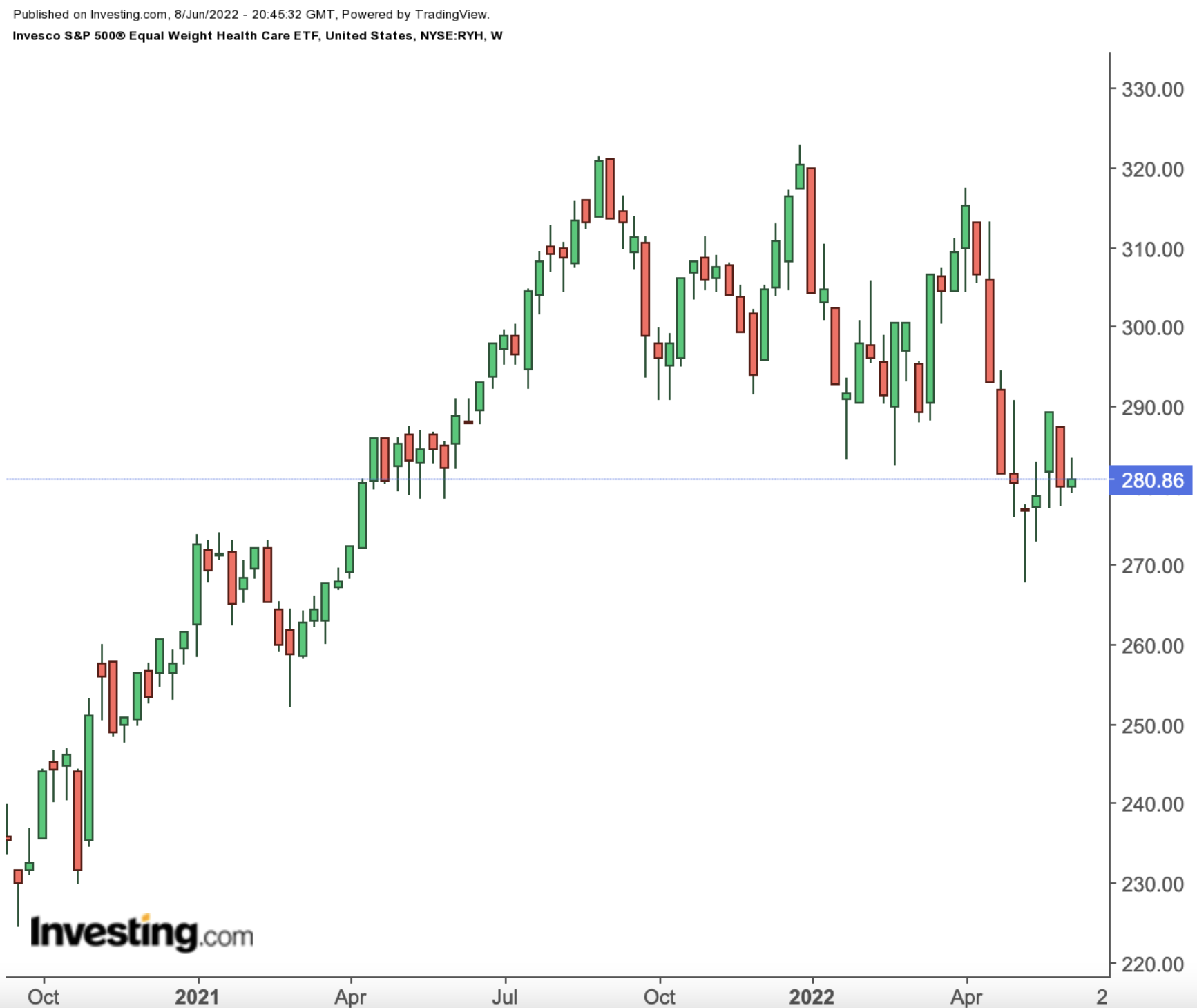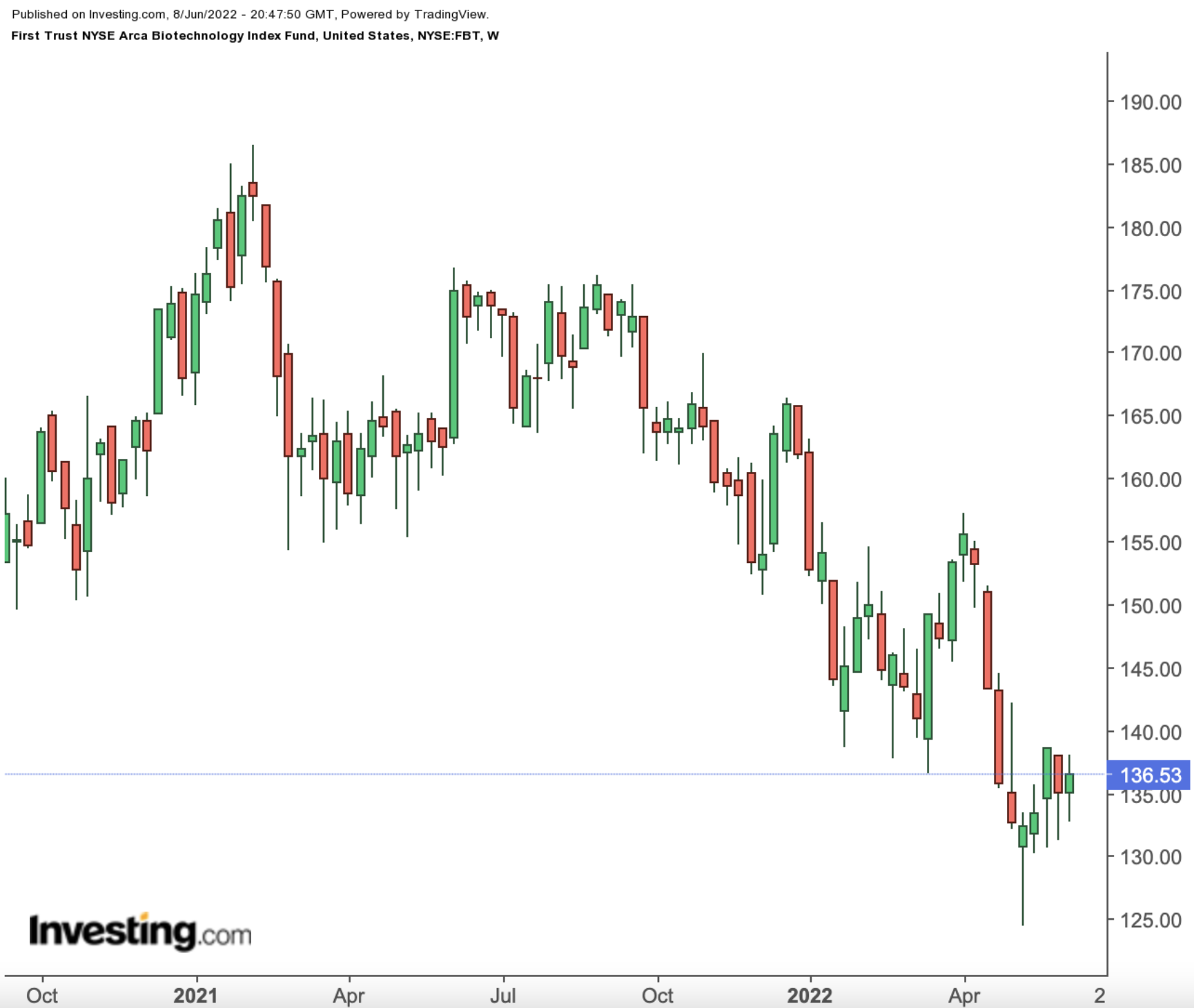The COVID-19 pandemic highlighted the importance of health care and the role biopharma companies play in drug and vaccine development. As a result, the sector grew tremendously during the past 2 years.
However, with the easing of global coronavirus restrictions, along with a broad market selloff, the fortunes of these companies changed entirely in 2022.
For example, the Dow Jones Health Care Index is down about 9.4% year-to-date—while still returning 3.5% over the past 12 months. On the other hand, the NASDAQ Biotechnology Index has dropped over 20.6% year-to-date (YTD) and 24.8% in the past 52 weeks, meaning it is now in the bear market territory.
In comparison, the S&P 500 and the NASDAQ 100 have lost 13.6% and 22.7% so far in 2022.
Still, these declines potentially offer better entry points into many robust stocks and exchange-traded funds (ETFs) that hold them. So, today's article introduces two ETFs that deserve readers' attention during the rest of the year.
1. Invesco S&P 500 Equal Weight Health Care ETF
- Current Price: $280.86
- 52-week range: $267.79 - $322.92
- 52-week range: 0.65%
- Expense ratio: 0.40% per year
Health care stocks are typically excellent defensive plays in an environment of high inflation and market volatility. In addition, metrics suggest these companies could further benefit from changing demographics stateside.
For instance, the most recent census shows that America is aging. Research highlights:
"By 2030, more people in the United States will be older than age sixty-five than younger than age five. Our health care system is unprepared for the complexity of caring for a heterogeneous population of older adults."
Health care spending currently accounts for about a fifth of the national gross domestic product (GDP). As the needs of Americans change and possibly increase, we can expect health care stocks to capture part of that growth as well.
Therefore, the first fund on today's list is the Invesco S&P 500 Equal Weight Health Care ETF (NYSE:RYH). It offers exposure to large- and mid-cap health care companies from the S&P 500 index.

RYH currently has 66 holdings, where the top 10 comprise almost 14% of $890.2 million in net assets. The fund was first listed in November 2006.
Over a quarter of the companies are in the health care equipment & supplies segment. Next come health care providers & services (24.6%), life sciences tools & services (18.2%), pharmaceuticals (15.4%), and biotechnology (13.1%).
Among the leading names on the roster are Viatris (NASDAQ:VTRS); Catalent (NYSE:CTLT), Merck & Company (NYSE:MRK), Vertex Pharmaceuticals (NASDAQ:VRTX), Eli Lilly (NYSE:LLY), McKesson (NYSE:MCK) and Cigna (NYSE:CI).
RYH hit a 52-week on May 12 and is down close to 12.3% YTD. Trailing price-to-earnings (P/E) and price-to-book (P/B) ratios stand at 16.75x and 4.26x.
We like the diversity offered by this equal-weight ETF. Interested readers could find long-term value in RYH around these levels.
2. First Trust NYSE Arca Biotechnology Index Fund
- Current Price: $136.53
- 52-week range: $124.43 - $176.64
- Dividend yield: 1.67%
- Expense ratio: 0.55% per year
Academic research suggests:
"The biotechnology industry has been an engine of innovation for the U.S. healthcare system and, more generally, the U.S. economy. It is by far the most research-intensive industry in the U.S."
At present, the U.S. biotech industry is valued around $140 billion. A recent survey revealed a "strengthening investor appetite" for biotechs despite the recent decline in biotech shares. Among the investors surveyed, "66% think that biotech will outperform the broader market in 2022," while "58% plan to increase their exposure to the sector."
Next up on the list is the First Trust NYSE Arca Biotechnology Index Fund (NYSE:FBT). It invests in global biotech firms that concentrate on life sciences tools, genetic engineering, molecular biology, and genomics. It started trading in June 2006, and has close to $1.3 billion in net assets.

This passively managed ETF tracks the ARCA Biotechnology Index. It is rebalanced quarterly and holds a basket of 30 stocks.
40% of the portfolio is the top 10 stocks. Among them are United Therapeutics (NASDAQ:UTHR), Grifols (NASDAQ:GRFS), Gilead Sciences (NASDAQ:GILD), Mettler-Toledo International (NYSE:MTD), Qiagen (NYSE:QGEN), Amgen (NASDAQ:AMGN), and Seagen (NASDAQ:SGEN).
FBT is down roughly 15.7% YTD and 19% over the past 12 months. The fund saw a multi-year low also on May 12.
Trailing P/E and P/B ratios stand at 15.11x and 3.61x. Contrarian readers ready to become "greedy when others are fearful" could consider buying the dips in FBT.
